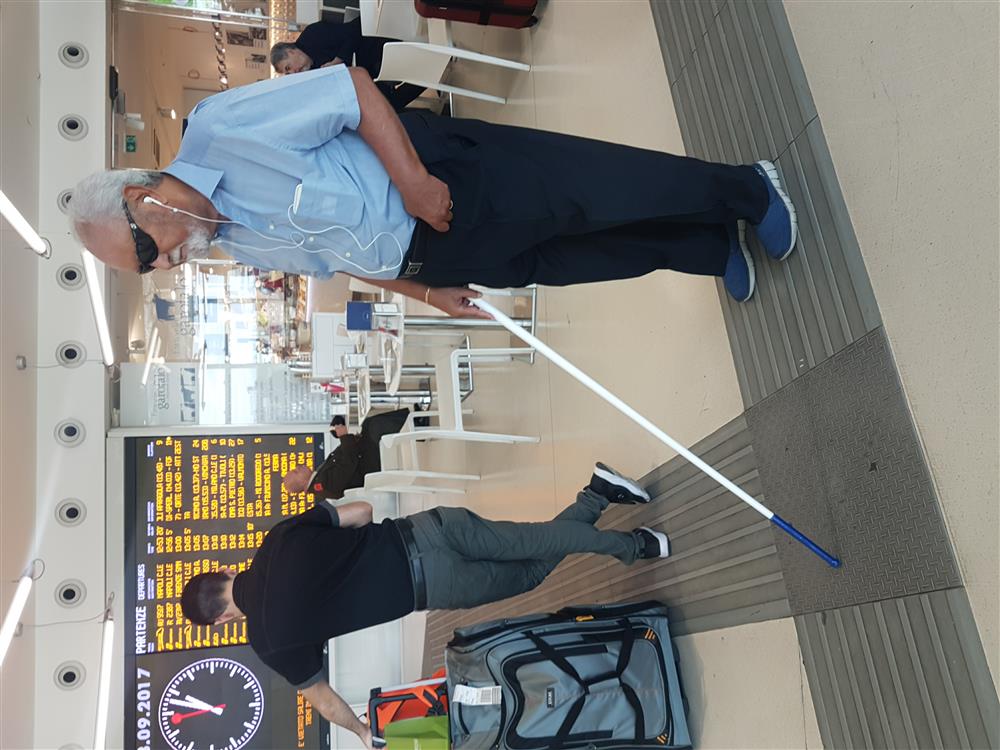Tactile paths giving voice commands via a smart stick and a mobile phone app
- Solution
- LVE smart stick system
- Organization
- JKJ S.r.l. - Plastic Solutions
- Country of Implementation
- Italy
- Region
- Europe
- Subregion
- Western Europe
- Start Year
- 2013
- First published
- 31.01.2018

Solution details
People
“The LVE system is a drop filling the ocean of human knowledge, scratching the wall of indifference, and showing new routes towards the culture of autonomy.” Mariano Lervolino, General Manager, JKJ Srl
JKJ Srl, an Italian plastic fabrication company and Associazione Disabili Visivi Onlus (National Associations for Visually Impaired People) have developed the Loges Vet Evolution (LVE) tactile path system with integrated communication tags. The path helps persons with visual impairments to navigate safely by giving voice directions to the user’s mobile phone about the path and surrounding spaces via a Bluetooth “Smart Stick.” Over 450 areas (mostly in Italy) have had the technology installed plus two paths in Belgium and one in Canada.
Problems Targeted
Persons with visual impairments have difficulties independently navigating public spaces and buildings, such as malls and hospitals, due to physical obstacles and a lack of accurate guidance information.
Solution, Innovation and Impact
The LVE system is made up of tactile paving (textured surfaces that allow visually impaired users to feel the different patterns through their feet, indicating directions and dangers) integrated with radio frequency tags. The user holds a Bluetooth-equipped smart stick, which receives instructions from the radio tags when it touches the path. These instructions are then sent via Bluetooth to an app on the user’s mobile phone, which reads out voice instructions, based on a downloadable map. The type of information provided is unlimited, but typically users are notified of intersections, crossings, the direction of travel, and points of interest along the route (e.g. “You are on the main street, and on your left is the Town Hall, which is open from 9 to 12”). Many conventional tactile technologies use infrared or GPS technology that can be confused by rain or large amounts of people in the area. Other navigation technologies are based on beacons powered by batteries, which run the risk of discharge. The LVE tags require no batteries and can be installed in a range of surfaces, including cement, stone, and PVC. JKJ Srl works with distribution partners and flooring technology companies to install the system. It is possible to install the paths in a range of scenarios, including public streets, public offices, hospitals, shopping centres, sport centres, airports, museums, and more. To date, the technology has been installed at more than 450 areas (e.g., a number of joined paths) in Italy.
Funding, Outlook and Transferability
The use of LVE technology has steadily increased from 70 areas installed in 2014 to 150 in 2016. The system has also expanded to outside Italy, with two paths being installed in Brussels, Belgium, and one in Vaughan, Canada. There are also plans for a second in Vaughan, with the system being featured on local television. The development of the product was carried out with ADV, a national non-profit organization funded through grants from civil society. The sales and expansion of the product is funded through the company as a commercial product of a private business.
Media
Life Story
THE STORY OF GIULIO NARDONE, NATIONAL PRESIDENT OF ASSOCIAZIONE DISABILI VISIVI
“A vocal-tactile paving system for the independence of visually impaired people.”
My name is Giulio Nardone, and I am blind. As the National President of the Italian Association of Visually Impaired People, the goal of my last 40 years’ activity has been to increase the autonomy of visually impaired people in all circumstances of their lives. As a blind person, I soon learned to move on my own, recognizing obstacles through my white cane. The real problem, however, has always been to move around in wide-open areas without natural guides. In 2013, in cooperation with the company JKJ srl, we added to every tactile tile a Radio Frequency Tag (created by myself back in 1995) that can send vocal messages to my smartphone and headphones using a special white cane. Using this new version of tactile paving, called LVE System (Loges-Vet-Evolution), it is much easier for me to follow a path, to know the exact point where I am, the name of streets, the location of the several services on my route, and even the hours of operation. Before LVE, all this was impossible. This now allows me to be totally independent, as I do not need anyone to escort me in order to move freely within the city. Once the system spreads to stations, airports, hospitals, and public spaces, the problems of orientation and security of visually impaired people will be progressively solved.
Related information
- Connections
- 2
-
Organization
- People